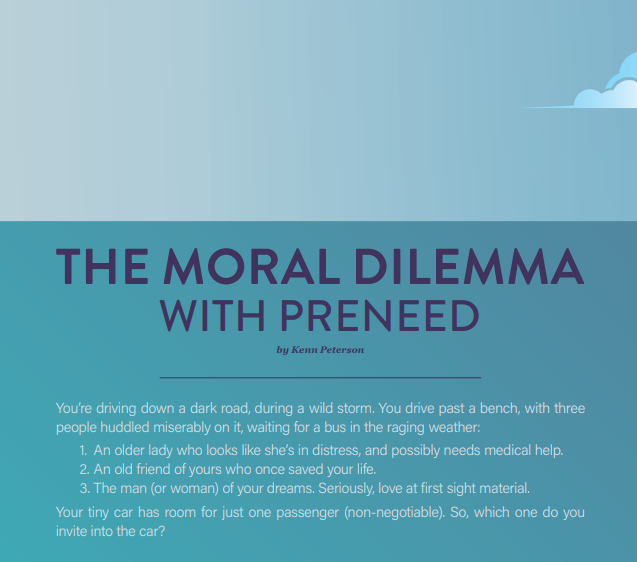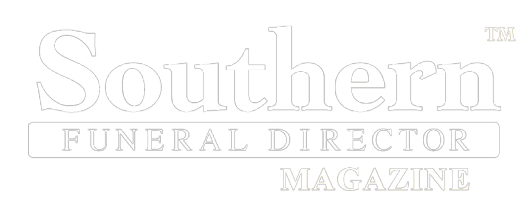(404) 312-6640
THE MORAL DILEMMA WITH PRENEED
If you choose the woman in distress, you’re a hero; if you leave her behind, you could be seen as a first-class heel. Or do you choose your old friend? You owe him a major favor, and you have a personal interest in this guy’s well-being. But then there’s your potential spouse, your possible future. What to do, what to do? You need to offer a well-reasoned response, but you have to do it fast. I am hopeful the ensuing compilation of ideas and questions will be thought provoking, fun to read and will cause you to obtain at least one piece of new learning so you can help more families make the worst day of their lives a little easier. What is a moral dilemma? It is “a decision-making problem between two possible moral imperatives, neither of which is unambiguously acceptable or preferable.” I believe most of us have heard about the “Trolley Car” dilemma. The general form of the problem is this: There is a runaway trolley barreling down the railway tracks. Ahead, on the tracks, there are five people tied up and unable to move. The trolley is headed straight for them. You are standing some distance off in the train yard, next to a lever. If you pull this lever, the trolley will switch to a different set of tracks. However, you notice that there is one person on the sidetrack. You have two options:
• Do nothing and allow the trolley to kill the five people on the main track.
• Pull the lever, diverting the trolley onto the side-track where it will kill one person.
Which is the more ethical option? What is the right thing to do? The complexity arises out of a situational conflict in which choosing one option would result in transgressing another.
If you knew something that would help someone but telling them may pose a risk to you, would you still tell them? Does it depend on the level of risk?
Should it depend on the level of risk? If preneed makes the worst day of someone’s life a little easier but you may experience less profit by telling them...are you obligated to tell them? Does it make you a bad person if you don’t?
How do you view preneed? Is it a necessary part of your business or a necessary evil? Is it an opportunity or obligation? Is it important enough to have a definitive, measurable process like at-need? Is it a focus of your business or a by-product of people walking through your door?
How do families in your community view preneed? If you asked 10 random people walking down the street in your community if they knew what preneed is, how many of the 10 would know what it is and the benefits it provides?
Have you ever had a family who you have prearranged and prefunded and you served at-need tell you they wished they would not have prearranged and prefunded? If not, shouldn’t you be telling everyone in your community? Anyone who will listen?
Do you like it when people make decisions for you…or do you like to make your own decisions? By not telling your families about preneed, you are deciding for them. Don’t do this. Tell them and let them decide for themselves.
Do you believe that telling families about something that makes the worst day of their lives a little easier is a responsibility you have as a moral funeral director or moral preneed professional?
Have you ever thought of preneed this way?
So many things to think about…
After thirty-seven years as a preneed professional, I’m more adamant than ever that the question is not should you be educating your families on an option that makes the worst day of their lives a little easier but how should you.
The other half of the moral dilemma with preneed is by educating families you may experience less profit. This occurs when the benefit available at death in your funding vehicle is less than your total charge if you would have performed that service at need. This is commonly referred to as a “shortfall.”
There are considerations aside from the funding vehicle that should affect your decision.
SHORTFALL RISK VS. DIRECT DISPOSITION
Do you believe prearranging “slows down” the effects of direct disposition?
In other words, if the direct disposition rate is less today than it will be in five years, doesn’t it make sense that prearranging people today will result in less direct disposition services than there would be without it?
If you prearrange 10 people today and 5 will choose some form of direct disposition, doesn’t it make sense that, if you wait, the number of people choosing direct disposition at need will be greater when the direct disposition rate is greater?
Have you ever looked at your preneed direct disposition rate and compared it to your at-need direct disposition rate? How many of your at-needs (that were preneed) would have been direct disposition if not prearranged? This is difficult to quantify but another benefit of preneed.
SHORTFALL RISK VS. LOSING OR GAINING A FAMILY
By proactively educating families prior to a death you have a better opportunity to serve that family…and not see them in the obits with another funeral home name.
Do you know how many “new” families your preneed program has brought to your funeral home?
SHORTFALL RISK VS. OVERHEAD
Any additional call your preneed program brings to the funeral home, above the case volume you used to calculate your overhead, doesn’t have any fixed overhead assigned to it. In other words, if you assign your overhead to 100 calls and your preneed program brings in 4 more calls so you do 104 calls…you do not have the fixed cost on these 4 calls...only the variable costs. Consequently, you make considerably more profit. Wouldn’t this go a long way in offsetting any reduction in profits from shortfalls on your other preneed?
Morally, does the risk of making less profit by telling someone something that will help them make it okay not to tell them?
If I asked 10 funeral service professionals this question…
• How many would say, “Yes?”
• How many would say, “No?”
SHORTFALL RISK VS. SOLIDIFYING CURRENT RELATIONSHIPS
Knowing something that helps the people you care about and making sure they know about it can only help your current client families trust you even more. This is a very important aspect of being a trusted advisor. This creates a loyalty and the greater likelihood that people they know will hear about you. The risk of not telling them and jeopardizing the relationships you have worked so hard to create and develop is not worth it. Tell them. Let them decide their choice. Regardless of their decision they will appreciate the fact you did.
PRENEED AUDIT
Have you completed a preneed audit to see how your funding product is doing? This involves using a simple Excel tool that allows you to see if all your preneed families died today, what would your claim check look like versus if they were all at-need cases? Completing a policy-by-policy audit, then aggregating the totals will help you see where you are.
Regarding the opening “Bus Stop” dilemma, the answer that resulted in a job offer was, I’d get out of the car, give the keys to my friend. He could drive the sick lady to the hospital, and I’d wait for the bus with the person of my dreams.
In ending, I have always imagined a commercial that shows two families at a picnic. Both families, through greetings and natural pleasantries, realize that they had both just experienced the loss of a parent. One family expresses their condolences to the other family. The second family expresses their reciprocal condolence. The second family, who had been educated on the benefits of prearranging and prefunding their father’s funeral, explained how thankful they were that they knew they did just what dad wanted. The other family, who were not allowed to prearrange and prefund, looked confused and stated how difficult it was for them because they had to guess what mom wanted which resulted in a sibling dispute. After further conversation, this family discovers no one told them they had the option to take care of things ahead of time.
Which family’s funeral director would you want to be?






Comments